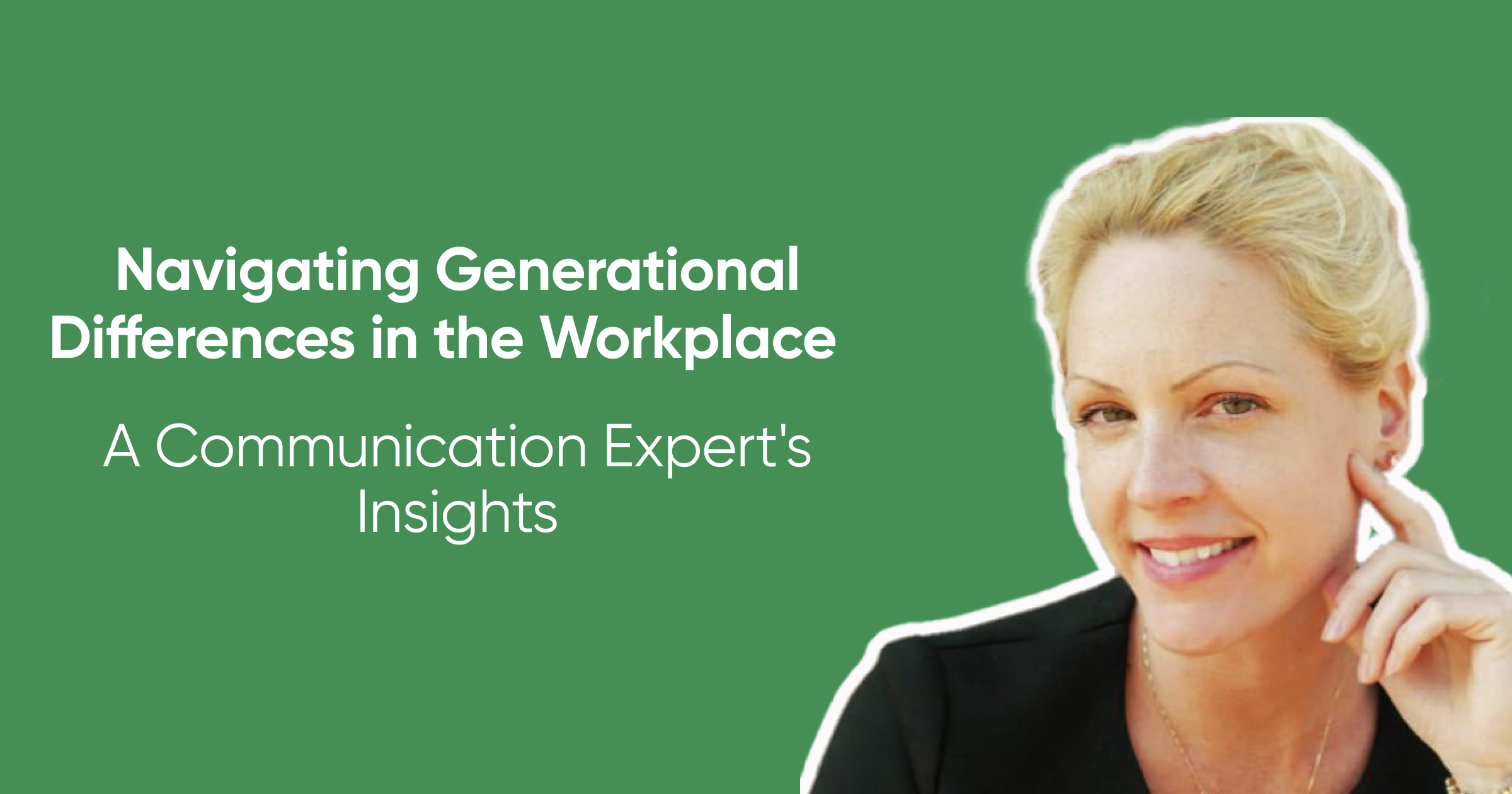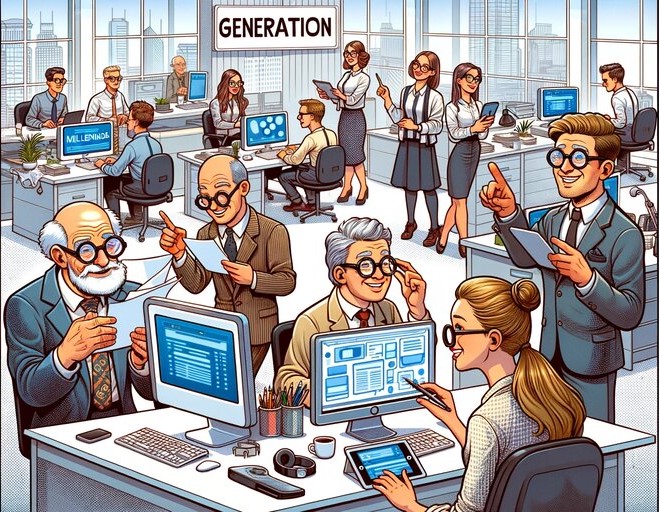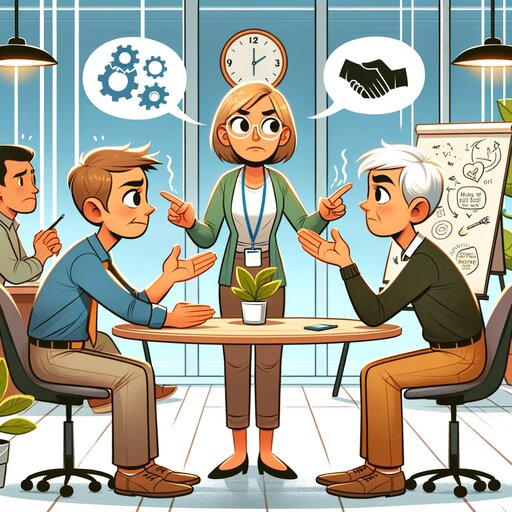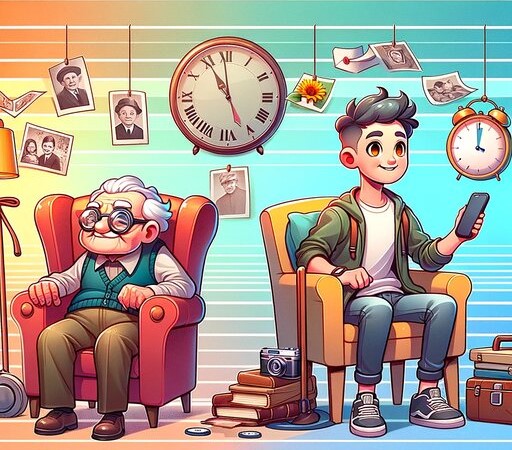Joshua Julien Brouard
22 February 2024 • 9 min read

As a professional communications trainer, Hanne Wulp's path has led her from the courtroom, where she dealt with litigation and mediation, all the way to her own business, Communications Wise.
Impressed by her background, we contacted Wulp for an interview, hoping to get some insights into how business owners can effectively navigate generational differences.
Hanne took a unique approach, seeking not to divide but to consolidate and understand.
Join me as I work with Hanne to uncover the reality of how organizations can effectively cope with the problem of generational differences.
"Generational differences" refers to the varying behaviors, values, attitudes, and expectations that exist among groups of individuals born in different time periods.
These differences are often shaped by the unique social, economic, political, and technological contexts experienced during the formative years of each generation.
They can impact various aspects of life, including:
Work preferences,
Communication styles,
And viewpoints on societal issues.
This leads to distinct intergenerational dynamics in both personal and professional settings.

As it stands, there are five generations in the workplace.
And it's clear that older workers and younger employees have some differences in values. Here is what each generally typically stands for:
Values: Loyalty, respect for authority, dedication, and a strong work ethic. They generally value job security and a clear organizational hierarchy.
Values: Hard work, achievement, ambition, and a strong sense of job loyalty. They tend to appreciate recognition, financial rewards, and professional advancement.
Values: Independence, work-life balance, flexibility, and informality. This generation values opportunities for personal and professional growth.
Values: Collaboration, diversity, sustainability, and a strong desire for meaningful work. They often value feedback, technology integration, and work flexibility.
Values: Technology fluency, individuality, creativity, and social activism. They prioritize inclusivity, mental health, and opportunities for rapid career advancement.
To start with the interview, I decided that because this topic is so divisive:
It may be best to start on a positive note.
When queried on what different generations have to offer, Wulp had this to say:
"Younger generations bring some sort of fire to the table.
They're excited; they want to get it done. They want to go fast.
They want to go on to the next project."
She elaborates:
"There are no problems, right? Because there's sort of this one-track mind to go to the next. And to get it done.
I think that this is a good thing — it can be a really good thing."
But of course, this attitude does come with its problems.

While attesting to how beneficial youthful ambition can be, there are some pitfalls. Wulp explains:
"There's also obviously a risk, you know, when you go fast, you can also stumble and fall."
But there's a solution - Hanne elaborates:
“And then the older generation, they're more seasoned, they're more experienced, they, in a way, know more.
So I think that that's what they can bring to the table. But then there's a risk to that part, too, right? Because when you've seen it before, you've dealt with it before, you know how to do it, so you can get somewhat rigid."
But according to Hanne, that's where the younger generations come in:
"And really, every situation, every customer, and every client is a little bit different from the previous situation.
So I think that's maybe where there's a little bit of a risk, and when there's good collaboration, everybody can just, you know, use each other's strength at the table."
Hanne taught me that the "root cure" of our differences is learning to stay open — read what she has to stay:
" So I think the biggest trick is when we learn to open up our minds to things that are different from what we've seen before, things that are different from what we think is true.
And this is with every conflict."
Hanne emphasizes that if we can just get "unstuck" from our beliefs and stay open, we can come to a resolution.
To elaborate on her point, Wulp thought it'd be helpful to lead this point home with an example:
"So let's say you're the older generation - I'm the younger generation.
And I want to stop analyzing the topic that we're working on because I think we know enough, and I think we can start moving, right?
But you're like, hold on, we haven't done this risk analysis. And I feel that you're holding me back, and you feel that we're not exploring this enough.
This is our problem now."
Wulp goes on to show us how we're really not so different in our perceptions:
"And then we also don't have a supervisor; we have to work it out with each other. And I put my heels in the sand, and I'm like:
No, Joshua. Let's just keep moving. You're holding me back. We have a deadline. And you're like:
No, I want to deliver a good product.
I'm not going to do this, and you're also putting your heels in the sand right now. We have positions.
I want to move; you want to stop.
And so now I've started seeing you as stubborn and close-minded.
And you, interestingly enough, also see me as stubborn and close-minded because I want to move, and you don't."

In the example, Hanne led me through and showed me how we'd hypothetically “work out our differences:”
"We are now seeing each other the same way — but wrong.
So then, you know, Hanne, the trainer, comes in, and she's like, well, now I want you to no longer be mad at each other. I want you to open your mind.
You're not ready.
You're not ready because ‘you know what you know, and I know what I know’ — right?"
Hanne clarifies the importance of active listening:
“So, it starts with a lot of listening. It starts with really wanting to know where you're coming from, what your concerns are, what your wishes are, and what your needs are. What are some obstacles that you see?
So now I've listened to you, and you've listened to me. And then we start exchanging, right?"
Wulp explains that simple understanding isn't enough; it also requires mutual goals:
"But what if we could determine where we want to go? Where's our common ground? What do we see similarly?
Because you and I work together and we work for the same company, there's our common ground. We know that we want our company to thrive; that's what we want.
And that is ultimately how we understand each other better.
And how we find options, opportunities, and solutions for our problems and move on."
Wulp thinks that the answer isn't so clear:
"Well, I don't think so.
I think yes but in certain aspects.
We have to consider what got the older generation where they are, right?
So, are they more productive? Well, they are in certain ways, but not in other ways.
And so I do think there should be a lot more listening and true listening, right? Like not: ‘I wait till you finish talking.’
But really, like, 'I want to know what's going on in your mind. I really want to understand because there are little beautiful ways of thinking in there that we can use to ultimately get to the next step together.'"
"So this is part of my training because a lot of people think when it comes to personalities, 'this is just who I am, and this is how I am, and you don't get to touch it.'
But when you take it a step beyond that, you and I and all the rest of the people in the world have similar psychologies, just human needs.
So, for example, you, I, and everybody else are social, so we want to belong. We want to be recognized.
We want to be seen and heard and understood, and then we all want some degree of control over our own lives."
Hanne explains further:
"We want some degree of freedom, but we also want some degree of security and safety: financially, physically, and psychologically.
So we can find each other in that — we all want. But maybe the degrees and how much we want of them - that can be different."
She goes on to show that it's all about stages in our lives and what matters to us at the time:
"And let's say now you're the younger generation, I'm the older.
Maybe you value adventure more than I do. Because I've already been through adventures, now I want peace.
So I might end up valuing community more at this point because now I'm older, you're younger."
(Perhaps we're not so different after all.)
"I'm saying let's focus on what we all have, what we all intrinsically need and feel. From there, I will acknowledge the differences.
I will acknowledge the differences in degrees, but I also know what you need because I needed it, too."

And to end off, I thought of asking Hanne one of the most frequently asked questions — do we get more resistant to change with time? Or is it just an attitude we develop?
"Okay, so my short answer is I do think it's an attitude, but I don't think that you will become aware of this if you don't practice mindfulness or self-awareness skills.
I would say, like most things, yes or no.
We fear because we don't like to lose what we have and change.
And change comes with sacrifices. And we don't like that. Nobody likes that. Nobody likes to sacrifice.
So I think when the older generation has a harder time with change, it is because they have, in a way, more to lose. Right?
They already have more - they have accumulated wealth, and they've had some sort of career.
They might have a family to take care of. So they have more responsibilities. Now, losing doesn't seem like a good idea at that point."
"But on the other hand, and this is why I say no, the older generation is fine because they've gone through life. They've already navigated life. You cannot go through life without losses. Right.
So maybe somebody has passed away. Maybe they went bankrupt. They've faced hardships.
Meanwhile, the younger generation doesn't have as much to lose. But they don't have as much callus on their skin to go through hardships and setbacks and these things.
The younger generation doesn't have much to lose, but they don't have much experience in hardships. The older generation has a lot more to lose, but they also know how to handle it.
So ultimately, I think yes, it is attitudes, and it is going along with the changes and understanding that the only constant is change."
Wulp's insights highlight the importance of embracing generational differences in the workplace.
She emphasizes that each generation brings unique strengths and perspectives.
The key to success in management and as an employee lies in active listening, mutual respect, and leveraging these diverse experiences for collaborative growth.
Wulp's approach encourages a shift from division to understanding, fostering an inclusive environment where all generations can contribute effectively.
(Learn more about Communications Wise in the below video!)
Foster open communication, respect diverse perspectives, and implement flexible policies that cater to the varying needs and expectations of different age groups.
Variations in technology use, differing workplace expectations and values, and contrasting social and political views are prominent examples of the generation gap.
The workplace includes Traditionalists (born before 1946), Baby Boomers (1946–1964), Generation X (1965–1980), Millennials (1981–1996), and Generation Z (1997 onwards).
Yes, generational differences can lead to disconnects due to varied communication styles and expectations, but proactive measures can mitigate these issues and harness diversity as a strength.
AUTHOR
Joshua J. Brouard has a diverse background. He has studied bachelor of commerce with a major in law, completed SEO and digital marketing certifications, and has years of experience in content marketing. Skilled in a wide range of topics, he's a versatile and knowledgeable writer.
Related Blogs

How to Renew a Trademark: A Guide That M...
17 May 2024 • 5 min read

How to Trademark a Name | Exploring the ...
17 May 2024 • 8 min read
.png%3Falt%3Dmedia%26token%3D61e4c1a1-34ee-427f-8cbe-48da50784682&w=256&q=75)
Will Palworld Get Copyrighted? (+ the Po...
17 May 2024 • 5 min read

7 Tips to Protect Your Business from Bra...
17 May 2024 • 8 min read

Can OpenAI Trademark GPT? (It’s Not That...
17 May 2024 • 3 min read